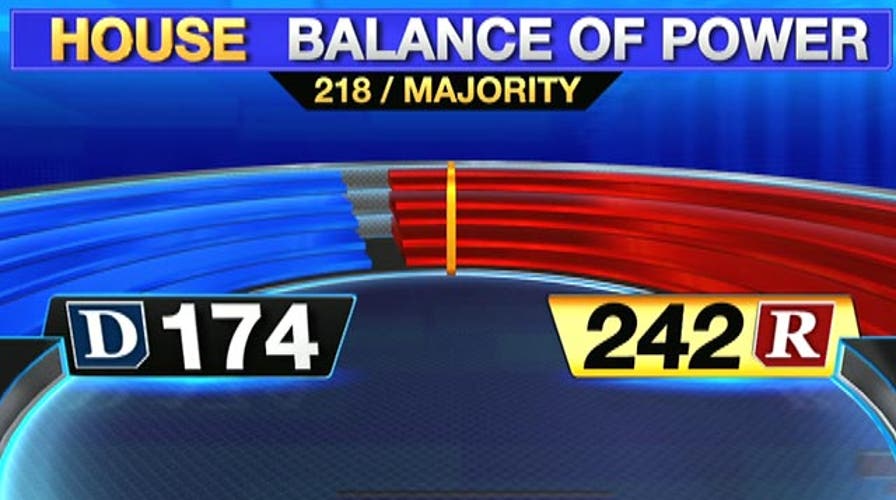A historic night for GOP, rejection of Obama
Midterms 2014: Pres. Obama said his policies were on the ballot and to Republicans' delight, he was right. #2014Midterms
Republicans had a big night -- that much was clear. But the full scope of the GOP’s victories came sharply into focus Wednesday, as party leaders touted not only their newly claimed Senate majority but historic gains in the House and state legislative races.
While Republicans’ capture of at least seven seats in the U.S. Senate grabbed the headlines, the party had even greater success at the state level. Party leaders said Wednesday they will hit an “all-time high” for the number of legislative chambers and seats in Republican control.
“It was a historic night at every single level,” Republican National Committee Chairman Reince Priebus said Wednesday.
With post-game analysis hardly in short supply, GOP leaders offered their own take on how the party pulled it off. They attributed their victories to carefully vetted and trained candidates (perhaps in contrast to 2012); to an improved ground game and intensive effort to target “low-propensity voters;” and to what they tried to make the No. 1 issue throughout the campaign – President Obama’s unpopularity.
“This was all about a direct rejection of the Obama agenda,” Priebus said.
Whether congressional Republicans and Obama can work together in the remaining two years of his term remains to be seen.
But at the state level, Republicans are poised to more aggressively advance their legislative agenda, particularly with several Republicans winning close gubernatorial elections Tuesday night – including in the heavily Democratic states of Maryland, Illinois and Massachusetts.
Luis Fortuno, former Puerto Rico governor and board member of the Republican State Leadership Committee, broke down the legislative numbers.
He said the party is on course to hold between 67 and 69 legislative chambers – up from the previous high of 64. He said they also are on track to eclipse the prior GOP high of 4,001 state legislative seats (held in 1928).
Among the chambers picked up were the Nevada Senate and Assembly; New Mexico House; New Hampshire House; and Colorado Senate.
And on the U.S. House side, Fox News projected that Republicans are expected to win at least 12 net seats to expand their majority beyond their post-World War II record of 246 seats set in the 1946 election.
But Rep. Greg Walden, R-Ore., chairman of the National Republican Congressional Committee, said when all results are in, “It may be a 100-year majority.”
“It was a huge night, historic night,” he said.
Meanwhile, Republicans so far have gained seven U.S. Senate seats, giving them a 52-seat majority – three races are still outstanding, in Louisiana, Alaska and Virginia.
Sen. Jerry Moran, R-Kan., chairman of the National Republican Senatorial Committee, chalked up the success of Senate candidates to a careful training program. The New York Times reported that this involved sending “fake” campaign trackers to trail GOP candidates – and forcing them to watch cringe-worthy moments from failed Republican campaigns of 2012.
On the other side of the aisle, Democratic strategists gave a mixed picture of the night.
“I won’t sugarcoat it – we always knew tonight would be a challenging night, and it was for Democrats at every level,” Rep. Steve Israel, D-N.Y., chairman of the Democratic Congressional Campaign Committee, said Tuesday. “But as tough as tonight was, we did everything in our control to narrow the Republicans’ pick-up opportunities and limit their chance to take advantage of the wave.”
He said the party was able to prevent Republicans from hitting the 29-seat gain “typically won in a second-term midterm.”
He added: “As a Mets fan, I’ve learned to look on the bright side – and we have a strong Democratic Caucus who will come to Congress next year focused on strengthening the middle class and working together on commonsense solutions."





